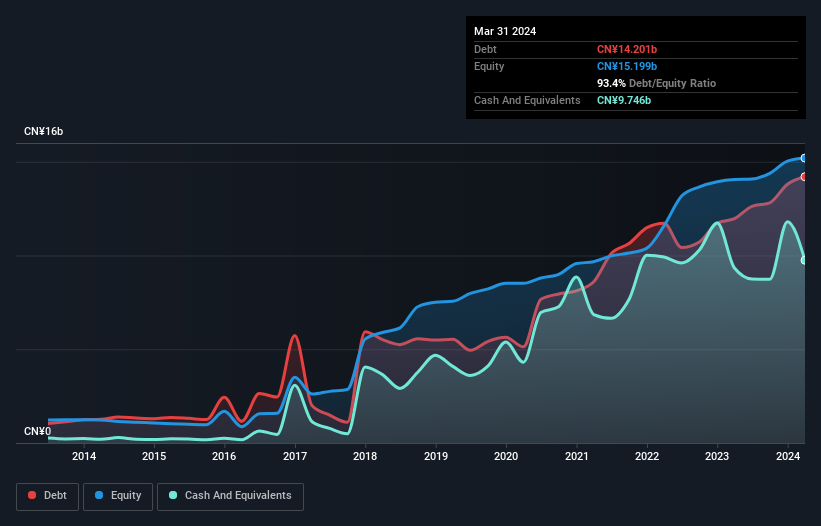Howard Marks put it nicely when he said that, rather than worrying about share price volatility, ‘The possibility of permanent loss is the risk I worry about… and every practical investor I know worries about.’ When we think about how risky a company is, we always like to look at its use of debt, since debt overload can lead to ruin. We can see that Zhejiang Communications Technology Co., Ltd. (SZSE:002061) does use debt in its business. But the more important question is: how much risk is that debt creating?
What Risk Does Debt Bring?
Debt is a tool to help businesses grow, but if a business is incapable of paying off its lenders, then it exists at their mercy. Part and parcel of capitalism is the process of ‘creative destruction’ where failed businesses are mercilessly liquidated by their bankers. However, a more frequent (but still costly) occurrence is where a company must issue shares at bargain-basement prices, permanently diluting shareholders, just to shore up its balance sheet. By replacing dilution, though, debt can be an extremely good tool for businesses that need capital to invest in growth at high rates of return. When we examine debt levels, we first consider both cash and debt levels, together.
See our latest analysis for Zhejiang Communications Technology
What Is Zhejiang Communications Technology’s Debt?
As you can see below, at the end of March 2024, Zhejiang Communications Technology had CN¥14.2b of debt, up from CN¥12.0b a year ago. Click the image for more detail. However, it also had CN¥9.75b in cash, and so its net debt is CN¥4.45b.

How Strong Is Zhejiang Communications Technology’s Balance Sheet?
The latest balance sheet data shows that Zhejiang Communications Technology had liabilities of CN¥42.4b due within a year, and liabilities of CN¥7.18b falling due after that. Offsetting this, it had CN¥9.75b in cash and CN¥35.3b in receivables that were due within 12 months. So it has liabilities totalling CN¥4.47b more than its cash and near-term receivables, combined.
Zhejiang Communications Technology has a market capitalization of CN¥10.5b, so it could very likely raise cash to ameliorate its balance sheet, if the need arose. But we definitely want to keep our eyes open to indications that its debt is bringing too much risk.
In order to size up a company’s debt relative to its earnings, we calculate its net debt divided by its earnings before interest, tax, depreciation, and amortization (EBITDA) and its earnings before interest and tax (EBIT) divided by its interest expense (its interest cover). Thus we consider debt relative to earnings both with and without depreciation and amortization expenses.
Zhejiang Communications Technology’s net debt to EBITDA ratio of about 2.0 suggests only moderate use of debt. And its strong interest cover of 1k times, makes us even more comfortable. We saw Zhejiang Communications Technology grow its EBIT by 9.8% in the last twelve months. That’s far from incredible but it is a good thing, when it comes to paying off debt. There’s no doubt that we learn most about debt from the balance sheet. But it is future earnings, more than anything, that will determine Zhejiang Communications Technology’s ability to maintain a healthy balance sheet going forward. So if you want to see what the professionals think, you might find this free report on analyst profit forecasts to be interesting.
Finally, while the tax-man may adore accounting profits, lenders only accept cold hard cash. So we always check how much of that EBIT is translated into free cash flow. Considering the last three years, Zhejiang Communications Technology actually recorded a cash outflow, overall. Debt is far more risky for companies with unreliable free cash flow, so shareholders should be hoping that the past expenditure will produce free cash flow in the future.
Our View
Zhejiang Communications Technology’s conversion of EBIT to free cash flow and level of total liabilities definitely weigh on it, in our esteem. But its interest cover tells a very different story, and suggests some resilience. We think that Zhejiang Communications Technology’s debt does make it a bit risky, after considering the aforementioned data points together. Not all risk is bad, as it can boost share price returns if it pays off, but this debt risk is worth keeping in mind. There’s no doubt that we learn most about debt from the balance sheet. However, not all investment risk resides within the balance sheet – far from it. For instance, we’ve identified 1 warning sign for Zhejiang Communications Technology that you should be aware of.
At the end of the day, it’s often better to focus on companies that are free from net debt. You can access our special list of such companies (all with a track record of profit growth). It’s free.
Valuation is complex, but we’re helping make it simple.
Find out whether Zhejiang Communications Technology is potentially over or undervalued by checking out our comprehensive analysis, which includes fair value estimates, risks and warnings, dividends, insider transactions and financial health.
View the Free Analysis
Have feedback on this article? Concerned about the content? Get in touch with us directly. Alternatively, email editorial-team (at) simplywallst.com.
This article by Simply Wall St is general in nature. We provide commentary based on historical data and analyst forecasts only using an unbiased methodology and our articles are not intended to be financial advice. It does not constitute a recommendation to buy or sell any stock, and does not take account of your objectives, or your financial situation. We aim to bring you long-term focused analysis driven by fundamental data. Note that our analysis may not factor in the latest price-sensitive company announcements or qualitative material. Simply Wall St has no position in any stocks mentioned.
